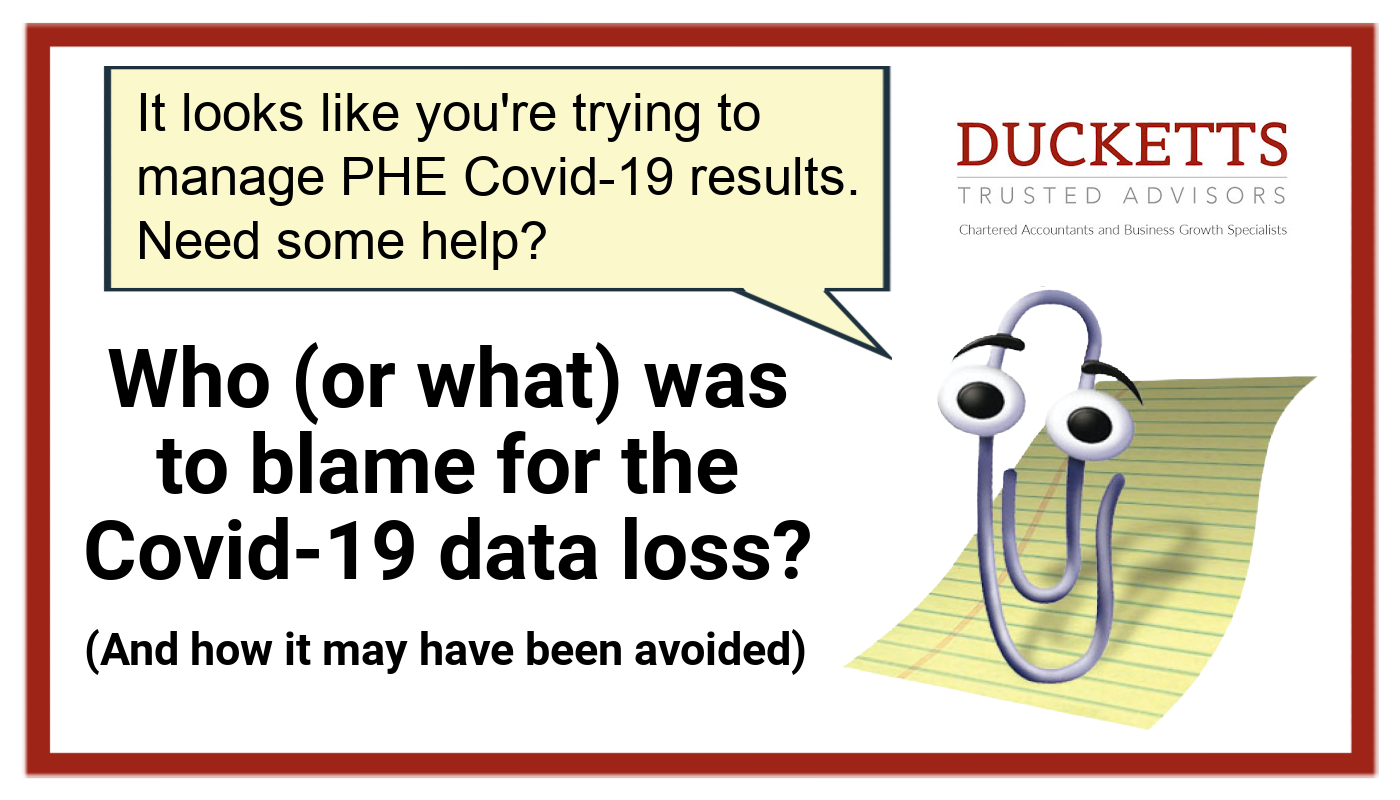Who (or what) was to blame for the Covid-19 data loss?
Published:

There's been a great amount of discussion within the accounting industry about the recent Covid-19 data debacle. Is it time to retire Excel or was something far simpler to blame?
The BBC recently conducted their own analysis of the issue which can be found here In which, they quoted the following from Prof Jon Crowcroft (Professor of Communications Systems in the Computer Laboratory of the University of Cambridge);
"Excel was always meant for people mucking around with a bunch of data for their small company to see what it looked like,"
"And then when you need to do something more serious, you build something bespoke that works - there are dozens of other things you could do.”
"But you wouldn't use XLS. Nobody would start with that."
We certainly wouldn't entirely disagree with the above statement from Professor Crowcroft. There are many great alternatives to Excel for managing your data. However, is treating this piece of software (which is used across the world by many huge multinationals) with such disdain truly justifiable?
To say that Excel was meant for “mucking about with data” or that it’s for their “small company”, demonstrates a fundamental misunderstanding of the role that spreadsheets play in the business world.
Far from being used by “small company(s)” Excel (and spreadsheets in general) underpins key systems of a great many financial institutions. Excel, in particular, has formed the basis of the majority of computerised accounting systems since its launch in 1985.
While we acknowledge the rise of software such as Xero and Quickbooks is revolutionising self accountancy for businesses, a sizeable number of companies large and small are still reliant on spreadsheets for the bulk of their accountancy.
Perhaps Prof Crowcroft is right and “Nobody would start with [XLS]”. However, many do and to disregard the usefulness of spreadsheets is to misunderstand how businesses in the UK actually work.
Perhaps, instead of demonising Excel, we should be focussing on how human error may play a factor and how this may be mitigated through education. The awareness of a spreadsheet's limitations can go a long way in ensuring that data losses are avoided.
This public scorn of Excel is far from an isolated example. Simon Hurst (Who spent 3 years as chairman of the ICAEW’s IT Faculty) spent many years “trying to persuade all sorts of organisations to take spreadsheets seriously and often came across the attitude that spreadsheets are just something that users play around with to the irritation of those responsible for the ‘real’ IT systems”.
To dismiss spreadsheets rather than acknowledging their limitations is one of the main reasons why misuse can cause such damage.
It’s all very well to say that for anything serious you can ‘build something bespoke’ but most businesses simply don’t have the time and resources to devote to developing a new system. What does that company do in the meantime? What happens when there are inevitable issues with the transfer of data from the old to the new systems? It just isn’t feasible.
Simon Hurst recently wrote an article titled “Spreadsheet Errors & the SEP Field”.
Simons article considers whether 'spreadsheet' errors are really due to the use of spreadsheets or to human error that happens to involve spreadsheets.
If spreadsheets are truly to blame then surely the focus should be in identifying and communicating such limitations, so that others don’t fall into the same data difficulties as were experienced with the Covid data issue. If the software wasn’t to blame and was in fact down to human error then chances are that the same (or similar) error would have occurred no matter what system was being used.
We all want to see the most appropriate and efficient systems being used to solve our personal, corporate and governmental data problems. As such, rather than rolling our eyes at spreadsheets in general we should be working to a solution that better manages a users expectations and assists effective training and development.
Hindsight is a beautiful thing and one can only wonder if all this may have been avoided if the poor civil servant (or servants) responsible had read the ICAEW Twenty Principles for Good Spreadsheet Practice. Doing so may not have only saved reputations and careers, but also avoiding potential harm to public health.
Adapted by an original article by Simon Hurst - Owner of The Knowledge Base and Information Technology and Services Consultant.
Latest Posts
Meet The Team - Phil Taylor
Tax Tips 2025
The New Tax Rules for Double Cab Pickups:
A Trip Down Memory Lane
History at Work

